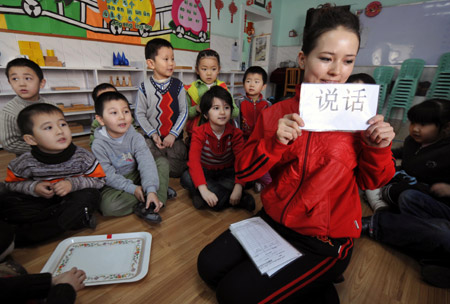
For immediate Release
June 13 , 2016 02:30pm EST
Contact: Uyghur Human Rights Project +1 (202) 478 1920
International Uyghur Language Day, commemorated on June 15th, was inaugurated in 2015 to celebrate the Uyghur language and to highlight state policies undermining its status in the Uyghur homeland.
The Uyghur Human Rights Project (UHRP) reminds China of its obligations to uphold the right of Uyghurs to receive an education in their own language and to encourage a flourishing environment for the Uyghur language free of government interference.
“International Uyghur Language Day is an opportunity to review the status spoken and written Uyghur holds in contemporary East Turkestan. The erosion of linguistic rights does not happen overnight; it is a gradual and in the case of China deliberate process. The incremental nature of language loss among Uyghurs necessitates consistent reminders of China’s obligations to international human rights standards,” said UHRP Director Alim Seytoff.
Mr. Seytoff added: “So-called bilingual education has been the primary means through which the government has ensured the Uyghur language has diminished in status among Uyghurs. China also punishes those Uyghurs who exercise their right to freely express themselves in their mother tongue. This kind of censure means the state is the unquestioned authority on publications in the Uyghur language-a situation that has led to a stifling of written Uyghur towards propagandizing jargon.”
In 2007 UHRP detailed how the Chinese government was implementing an education policy that effectively marginalized the Uyghur language from the education system in East Turkestan. The ‘bilingual education’ policy was designed to transition Uyghur students at all levels from education in their mother tongue to education in Chinese. At the 2014 Work Forum, Chinese officials placed ‘bilingual education’ at the center of efforts to achieve ‘ethnic mingling,’ an initiative aiming to blur the cultural distinctiveness of the Uyghur people and assimilate Uyghurs into the Chinese nation dominated by the Han culture. The Chinese government has stated that by 2020 almost the entire non-Han Chinese student population will be educated in ‘bilingual education’ schools.
In 2015, UHRP published Uyghur Voices on Education: China’s Assimilative ‘Bilingual Education’ Policy in East Turkestan. The report detailed on-going problems with the ‘bilingual education’ policy, including noticeable differences in funding and class size in Uyghur-majority schools and reports of Uyghur teachers who have lost their jobs as a result of unreasonable requirements for Mandarin language qualifications. The shortage of teachers in East Turkestan often means unqualified Han instructors are hired to fill the gap.
UHRP also found those Uyghurs who had managed to acquire strong Mandarin skills despite such conditions were more likely to struggle in finding employment compared to their Han counterparts due to endemic discrimination in the hiring process.
Furthermore, UHRP’s findings indicated space for original writing in Uyghur declined in the wake of the July 5, 2009 unrest. Although new websites have appeared since 2010, which do enable communication in Uyghur, state censorship, and consequently, self-censorship has increased. Many available forums open to extensive Uyghur language writing on current events and cultural and scientific matters appear to have been relegated to official websites, and in many cases these articles have been translated from Mandarin.
Since the publication of UHRP’s 2015 report, China has moved to strengthen ‘bilingual education’ in pre-schools. A December 9, 2016 report in the Global Times described how officials in Aksu prefecture intended to establish ‘bilingual education’ kindergartens in every village. A Xinhua report published on May 25, 2016 detailed the recruitment of 11,000 teachers from around China in order to ease a “teacher shortage.” A June 27, 2015 article in The Economist on the problems facing the ‘bilingual education’ policy stated: “The Xinjiang curriculum is about learning to be Chinese. Schools prize “patriotic education” even more than others in China.”
On International Uyghur Language Day, UHRP calls on China to:
Realize Article 26.3 of the Universal Declaration of Human Rights:
Parents have a prior right to choose the kind of education that shall be given to their children.
Ratify the International Convention on Civil and Political Rights and implement the provisions protected in Article 27:
In those States in which ethnic, religious or linguistic minorities exist, persons belonging to such minorities shall not be denied the right, in community with the other members of their group, to enjoy their own culture, to profess and practice their own religion, or to use their own language.
Realize Article 4.4 of the Declaration on the Rights of Persons Belonging to National or
Ethnic, Religious and Linguistic Minorities:
States should, where appropriate, take measures in the field of education, in order to encourage knowledge of the history, traditions, language and culture of the minorities existing within their territory.
Meet obligations set out in Article 29.1(c) of the Convention on the Rights of the Child:
States Parties agree that the education of the child shall be directed to:
The development of respect for the child’s parents, his or her own cultural identity, language and values...
